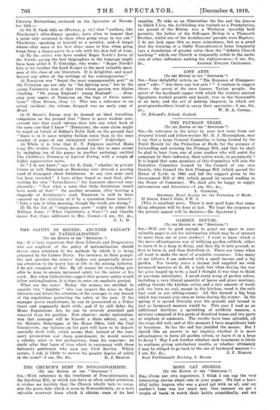GARDEN REFUSE.
[To THE EDITOR OF THE "SPECTATOR."] SIR,—Will you be good enough to grant me space in your
valuable pages to ask for information which may be of interest to more than one of your readers? I want to know which is the more advantageous way of utilizing garden rubbish, either to leave it in a heap to decay, and then dig it into ground, or first to burn it, and then distribute it. There are times when all want to make the most of available resources. Like many of my fellows, I am endowed with a small income and a big garden. For twenty years a farmer had supplied me with farmyard manure at 3s. 6d. a load; but when during the war his price leaped up to 8s. a load I thought it was time to think of war-time substitutes. I saved every scrap of garden refuse, including a very liberal quantity of leaves and grass mowings, adding thereto the kitchen refuse and a fair amount of wood- ash (we burn no coal, except in the kitchen; wood is the only fuel used in our sitting-rooms). All this formed a big heap which was turned over once or twice during the winter. In the spring it is spread liberally over the ground, and turned in just as farmyard manure would be. This year I used as an additional fertilizer a sprinkling of artificial manure, a mixture composed of five parts of dissolved bones and two parts of sulphate of ammonia. The results have been splendid, all
the crops did well, and at this moment I have magnificent beds- of brassicas. So far the end has justified the means. But I
should like an answer to my inquiry, whether it is more advantageous to burn all garden refuse, or leave it in a heap to decay ? May I ask further whether such treatment is likely to continue giving satisfactory results, or whether ultimately I may be obliged to go back to the use of farmyard manure ?-
I am, Sir, &c., J. F. HAMLYN. East Portlemouth Rectory.. S. Devon.














































 Previous page
Previous page